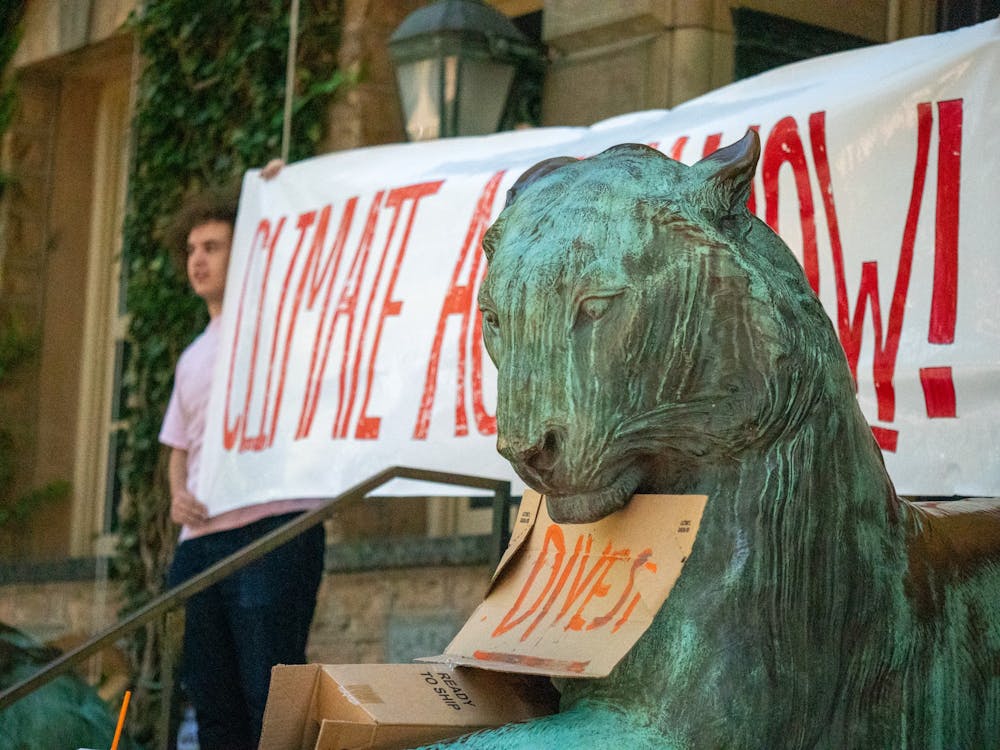Princeton’s Carbon Mitigation Initiative (CMI) will decide whether to renew its contract with BP, one of the world’s largest oil and gas companies, this coming year. BP has spent millions to fund energy and climate research at CMI as part of its misleading effort to convince the world that the company is serious about tackling the climate crisis.
However, mounting evidence suggests that even if BP once had genuine climate commitments, it has now abandoned them. The company’s recent decision to throw away its goal to reduce oil and gas production by 2030 is the latest indicator that it should not be considered a credible partner for sponsoring Princeton’s world-class climate research.
Therefore, Sunrise Princeton calls on High Meadows Environmental Institute Director Gabriel Vecchi and University President Christopher Eisgruber ’83 to end BP’s relationship with Princeton when its contract comes up for renewal next year. In a recent USG referendum, an overwhelming majority of the student body voiced agreement with this verdict.
BP’s climate deception is nothing new: it has attempted to market itself as environmentally friendly for decades. In the 1990s, BP’s CEO, Lord John Browne, responded to a growing concern about global warming by changing the company’s messaging in case people started to “take climate change seriously,” according to journalist Steve Coll.
According to Coll, Brown approved a new marketing slogan for the company, “Beyond Petroleum,” and rebranded its logo to the green sunburst icon we know today. In an early example of greenwashing, BP loudly invested in a few select solar projects while the rest of its business quietly continued, as usual, to operate almost exclusively in oil and gas.
CMI, a research group at Princeton, was a product of Brown’s marketing campaign. The company was a founding sponsor of CMI in 2000, and has spent over $32 million on the program in the last decade. Through the partnership, BP has supported important research on climate patterns including tropical storms and the methane cycle. CMI also focuses on research priorities that BP has used to justify its continued production of fossil fuels, such as carbon capture and storage technologies that, as one CMI leader told BP, could “enable the full use of fossil fuels across the energy transition and beyond.”
In return, BP uses CMI to greenwash the company’s image. Indeed, BP thinks of CMI as a “core programme” in its project to “authenticat[e] BP’s commitment to low carbon,” especially in the company’s efforts to “advance and protect” the role of natural gas in our future energy system. Top BP executives frequently tout BP’s funding of CMI to boost their green credentials, and they have brought CMI researchers to private events to show their purported seriousness at tackling climate change.
To BP, this greenwashing cover is important, helping to distract from the company’s true “core business”: pulling more oil and gas out of the ground. While the company has signaled support for climate policies, including the Paris agreement in 2015, its actions tell a different story. Between 2016 and 2021, BP spent $84 billion on expanding its oil and gas business — and only $3.2 billion on its renewable business.

Furthermore, the company actively promotes climate obstruction and denial by operating as a paying member of the American Petroleum Institute (API) and seven other organizations that knowingly run disinformation campaigns on climate change and lobby to block critical climate legislation. BP allows these organizations to advance its fossil fuel interests while downplaying its complicity.
The company has also directed disinformation campaigns in-house. Its “carbon footprint” ad campaign blamed consumers for causing climate change and drew attention away from BP’s own role in producing carbon pollution. BP also sought to deny its criminal negligence in causing the catastrophic Deepwater Horizon spill in 2010. BP is currently being sued by several states and municipalities, including New Jersey, for deliberately spreading consumer disinformation. Last month, Maine was the latest state to launch its own lawsuit against BP.
Meanwhile, CMI explicitly promotes BP’s greenwashing in many of its research reports, enthusing about “current bp efforts towards a sustainable energy world,” its goals to cut emissions in cement production and other heavy industry, or its actions aimed at tackling methane emissions.
Although CMI researchers may claim to have pushed BP to adopt stronger goals in some areas, overall, they appear unable to convince the company to follow through. Setting goals is different from delivering on them. For example, while researchers pushed BP to strengthen its methane emission reduction targets, the company has failed to follow through on those targets in practice.

Moreover, BP’s recent “green retreat” from its renewables investments shows that the company prioritizes shareholders, not researchers, when it decides how much to double down on dirty energy — no matter the consequences for our planet.
This year, BP’s new CEO proved this when he started selling off or scrapping the company’s renewable energy projects — pulling out of all of its onshore wind farms in the US, outright discarding BP’s goal to reduce oil and gas production by 2030, and pursuing new fossil fuel holdings in Iraq despite urgent calls from scientists that new fossil fuel production would doom international climate goals. If BP ever listened to CMI researchers when setting goals, that era is certainly over.
BP cannot be considered a credible climate partner for Princeton’s research, and its relationship cannot continue. Fortunately, BP’s contract with CMI is up for renewal in 2025, giving the University an opportunity to close out the partnership. Students voted 77 percent in favor of this course of action in a recent USG referendum.
Therefore, we urge Eisgruber and Vecchi to listen to Princeton students when we say: Princeton must cut ties with BP.
You can add your voice here.
Alex Norbrook (he/him) and Ryan Divan (he/him) are members of Sunrise Princeton, an organization calling for fossil fuel dissociation. They can be reached at an4725[at]princeton.edu and rd2700[at]princeton.edu, respectively. Norbrook is also a staff Opinion writer.








